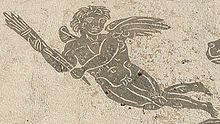| Hymenaios | |
|---|---|
God of weddings, reception, and marriage | |
| Member of the Erotes | |
 Hymen depicted on a Roman mosaic, Ostia Antica | |
| Abode | Mount Olympus |
| Symbol | Bridal torch |
| Parents | Magnes and Calliope[1] Apollo and Calliope Apollo and Clio Apollo and Terpsichore Apollo and Urania Dionysus and unknown mother[2] Dionysus and Ariadne[3] |
| Equivalents | |
| Roman | Talasius |

In Greek mythology, Hymen (Ancient Greek: Ὑμήν, romanized: Humḗn), Hymenaios or Hymenaeus, is a god of marriage ceremonies who inspires feasts and song. Related to the god's name, a hymenaios is a genre of Greek lyric poetry that was sung during the procession of the bride to the groom's house in which the god is addressed, in contrast to the Epithalamium, which is sung at the nuptial threshold. He is one of the winged love gods, the Erotes.
Hymen is the son of Apollo and one of the muses, Clio or Calliope or Urania or Terpsichore.[4][5][6][7][8]

- ^ Cite error: The named reference
Metamorphoseswas invoked but never defined (see the help page). - ^ Cite error: The named reference
Medeawas invoked but never defined (see the help page). - ^ Cite error: The named reference
ServEclgwas invoked but never defined (see the help page). - ^ Nonnus, Dionysiaca 33.67
- ^ Vatican Scholiast on Euripides' Rhesus, 895 (ed. Dindorf)
- ^ Scholiast on Pindar's Pythian Odes 4.313
- ^ Alciphron, Epistles 1.13.3
- ^ Tzetzes. Chiliades 8.599